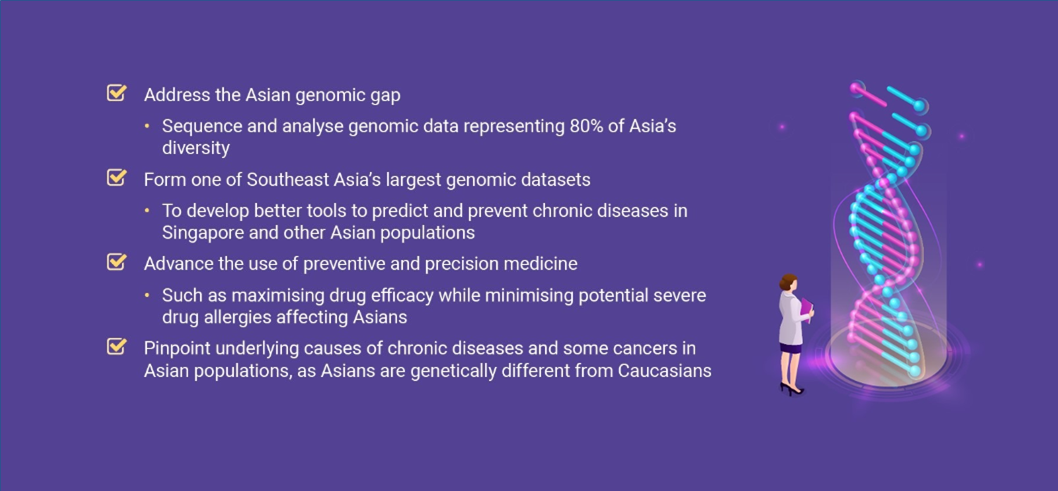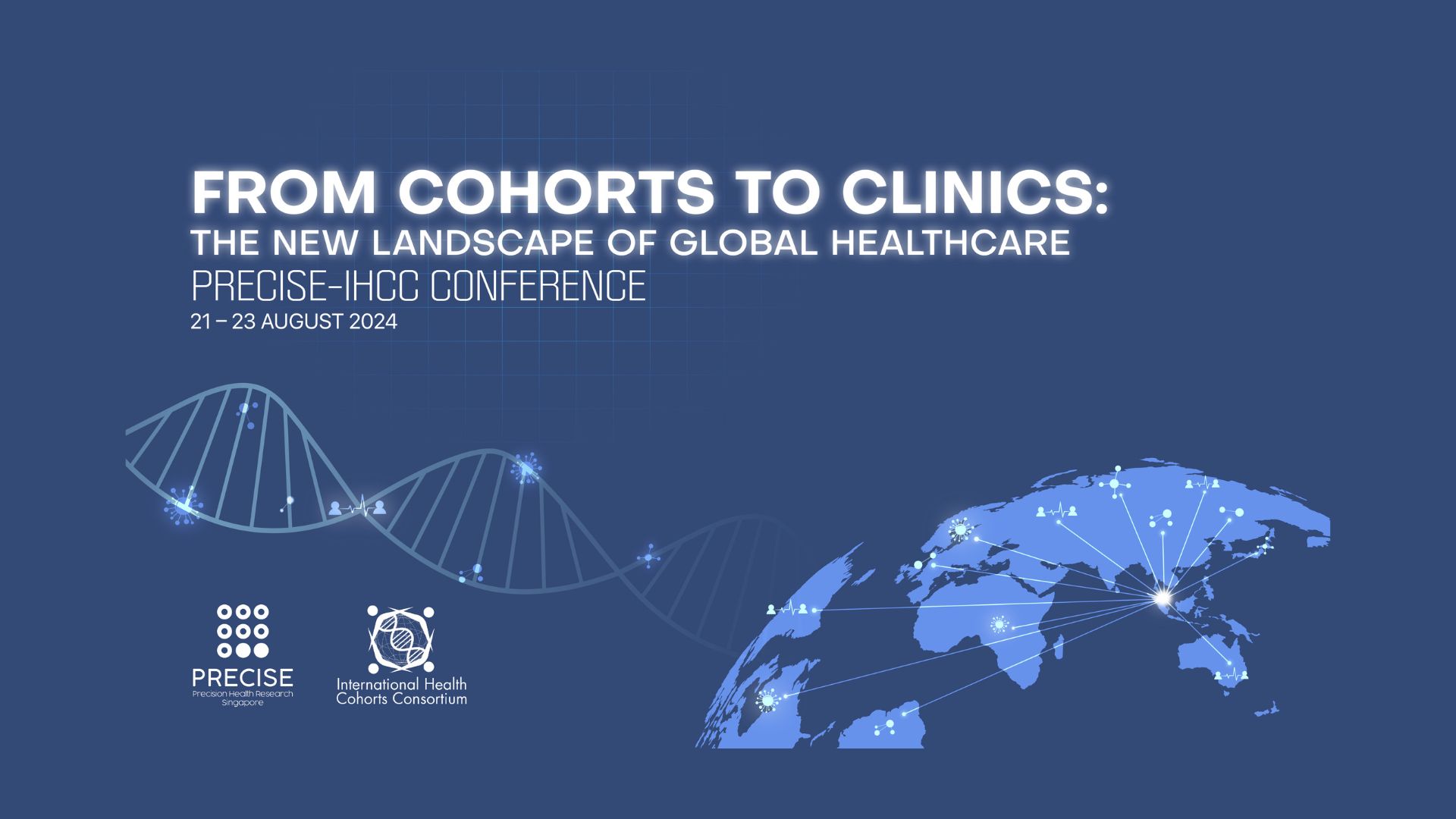IHCC Cohort Spotlight: PRECISE - Singapore National Precision Medicine Programme

Singapore’s contribution to precision medicine to shape the future of healthcare and the PRECISE-SG100K study
Precision medicine offers an effective means of translating research into more efficient healthcare delivery systems and better health outcomes for populations. Globally, nations are witnessing an increased incidence of chronic diseases and an aging population due to longer life expectancy prompting the shift towards building sustainable healthcare systems.
On the back of rapid advancement of predictive analytics and genomic sequencing capabilities, data-driven insights can serve as the welcome solution to enhance healthcare policies and services to improve population health for the future.
Precision medicine in Singapore
To realise the benefits of precision medicine, Singapore has established the National Precision Medicine (NPM) programme, which is a three-phase roadmap to establish Southeast Asia’s most deeply phenotyped cohort to support understanding of multi-ethnic Asian health; implement a data-driven healthcare system to identify groups at higher risk of disease and progression; and catalyse Singapore’s precision medicine industry by uplifting local companies and attracting multi-national companies.

In NPM Phase 1, the programme generated the world’s largest multi-ethnic Asian reference database known as SG10K_Health. It provided insights into genetic conditions prevalent in Asia and clinicians are using it as a de-identified reference database to manage patients with genetic diseases.
NPM Phase 2 is currently underway to scale this database. This effort is led by Precision Health Research, Singapore (PRECISE), the central entity set up to coordinate a whole-of- government effort to implement the current phase of the NPM programme. In December 2022, PRECISE-SG100K was launched – a landmark population health study of 100,000 consented Singaporeans to identify the social, environmental, lifestyle and genetic factors associated with diseases prevalent in Singapore.
The PRECISE-SG100K study
The PRECISE-SG100K study is part of NPM Phase 2. It is a comprehensive, long-term study focusing on the health and well-being of the Singapore population.
It was set up as a partnership between leading researchers at the Lee Kong Chian School of Medicine at the Nanyang Technological University (NTU), the Saw Swee Hock School of Public Health, National University of Singapore, the Singapore Eye Research Institute, the Singapore National Eye Centre, the National Heart Centre Singapore, and their associated healthcare partners. This project is supported by the National Research Foundation, Singapore, through the Singapore Ministry of Health’s NMRC and PRECISE.
Singapore’s population is unique with people of various ethnicities, Chinese, Malay and Indian, which together represents at least 80% of genetic variation in Asia. Hence, this deeply phenotyped and well-characterised dataset will be Asia’s leading reference genome database and will contribute significantly to the area of population health management.
Health data (e.g. waist-hip measurement, cholesterol level, bone density, lung function, cardiovascular health, blood pressure, fitness, eye acuity, cognitive assessment, health and participant responses from a lifestyle questionnaire) and biological specimens (blood, urine, stools, etc.) are collected from participants to generate in-depth profiles. Samples from each participant contains over 1,000 parameters.
The information collected and analysed from this study will seek to build a comprehensive dataset to understand the social, environmental, lifestyle and genetic factors that are associated with diabetes, hypertension, cancer and other chronic diseases in the multi-ethnic population of Singapore.
Even after the 100,000 datasets are collected and recruitment for this study is completed, the study will continue to monitor the long-term health outcomes of PRECISE-SG100K participants through a combination of approaches, including electronic medical records, disease registers and invitations for further follow-up.
What does PRECISE-SG100K hope to do

Partnerships and collaborations
Behind the scenes of the PRECISE-SG100K study, PRECISE has formed strategic partnerships with the academic and healthcare institutions, as well as the industry to sequence and analyse 100,000 Singaporean whole genomes.
This includes working with various laboratories and technology partners to sequence and analyse the DNA, such as the Health for Life in Singapore (HELIOS) population cohort study located in the Lee Kong Chian School of Medicine at NTU, Genome Institute of Singapore under the Agency for Science, Technology and Research (A*STAR) where the DNA is extracted, and thereafter to NovogeneAIT Genomics which provides next-generation sequencing services, leveraging the SG100K-Illumina Genomics Architecture. Additionally, PRECISE also welcomed Boehringer Ingelheim as its first pharmaceutical partner to enhance and work with the PRECISE-SG100K study to better understand the primary risk factors for chronic conditions of high importance to Asian populations.
Strategic partnerships such as these allow PRECISE to collaborate on enterprise-grade data exchange platforms for the secure handling and sharing of anonymised biospecimen data for sequencing, and the development of Artificial Intelligence (AI) approaches for genomics analysis.
Local sequencing companies in Singapore such as NovogeneAIT Genomics have also benefitted from this collaboration, through training and certification in the usage of Illumina’s proprietary platforms; allowing them to access new markets in the region and internationally.
Clinical Implementation Pilot (CIP) studies
In Phase 2 of the NPM journey, PRECISE is working with clinicians to pilot the implementation of precision medicine workflows into Singapore’s healthcare system.
The five CIPs span across these clinical areas: Breast Cancer, Hereditary & Familial Cancers, Familial Hypercholesterolemia, Primary Glomerular Diseases and Pharmacogenomics.
These pilots look to facilitate the incorporation of genetic testing into clinical pathways to improve patient outcomes while maintaining sustainable per capita cost and optimising the healthcare experiences for both healthcare providers and patients.
- Breast Cancer – BREAst Screening Tailored for HEr (BREATHE) – Pilot study of a risk-based breast cancer screening approach in Singapore
Women make up over half the population in Singapore. Of those aged 50 to 69, over 94% know about breast cancer screening, yet less than 40% of this age group had not gone for mammography screening.
The BREATHE study is looking to reshape the age-based paradigm for breast cancer screening in Singapore. The study evaluates the feasibility of a risk-based breast cancer screening approach and its cost-effectiveness as compared to current age-based practices.
- Hereditary & Familial Cancers – Improving access for clinical hereditary cancer genetic testing in Singapore
In Singapore, research data shows a high prevalence of hereditary breast and ovarian cancer and Lynch syndrome. This CIP seeks to evaluate the feasibility and cost effectiveness of a gene-directed risk stratified approach for breast and colon cancer screening.
- Familial Hypercholesterolemia (FH) – Addressing the challenges in Case identification, Cascade Screening, Genetic testing and Treatment in Familial Hypercholesterolemia – a cross-cluster clinical implementation pilot by Familial Hypercholesterolemia: Case Identification, Assessment and Reduction in Adverse Events (FHCARE)
FH is caused by an inherited gene mutation which causes certain individuals to have very high low-density lipoprotein (LDL) cholesterol levels from birth. This CIP, via the FHCARE programme is screening young people with very high cholesterol levels for the gene mutation that causes FH. If it is found that they carry the mutation, the screening is extended to their family members as there is a high chance a person with FH has close relatives with the same condition.
- Primary Glomerular Disease (PGD) – Health and Economic Impact of Next Generation Sequencing in Primary Glomerular Diseases in Singapore
Early testing, including genetic testing for PGD has potential to transform the lives of patients, enabling earlier diagnosis and streamlining treatments.
This pilot explores how precision medicine can revolutionise kidney disease management, potentially reduce healthcare costs and allow for more accurate diagnosis for improved patient outcomes.
With reported improved outcomes, this CIP aims to enable the ecosystem to set up the necessary support and infrastructure for sustainable and scalable future processes in PGD.
- Pharmacogenomics – Clinical Implementation of Pre-emptive Pharmacogenomic (PGx) Testing as a Precision Medicine Tool in Routine Clinical Practice in Singapore
This CIP pre-emptively screens study participants for a panel of genes to see if they have genetic variants that could lead to a bad reaction to medications commonly used for conditions such as stroke, cancer and depression or render them less effective.
Knowing in advance if an individual is allergic to or suitable for a particular drug before they take it can optimise the medical care they receive and allow for improved patient outcomes. The study will also seek to identify the target population most likely to benefit from pre-emptive PGx testing.
What’s next in Singapore’s NPM journey?
In Phase 3, the NPM programme will scale-up genomic sequencing to include a larger cohort, and the genomic data from the cohort studies will be linked with clinical and lifestyle data to create large-scale Singaporean databases. With these deep insights, one of the goals is for precision medicine workflows to be implemented in a responsible and sustainable way.
PRECISE is also working with a network of partners from the industry, public sector and the wider research community to ensure that the NPM is anchored on equity of data access, data security and privacy. Stringent measures are in place to ensure that approved research organisations will maintain responsible access to this broad spectrum of data sets.
Ultimately, doctors and scientists can use these valuable resources to reach a deeper understanding of how diseases develop and discover better ways to prevent and treat them.
References
[1] https://www.npm.sg/partners/precise-sg100k/
[2] https://www.npm.sg/news-and-events/editorial-features/sg100k-translating-insights-from-100000-genomic-data-sets/ and https://www.npm.sg/news-and-events/press-releases/precise-illumina-partnership-agreement/
[3] Epidemiology & Disease Control Division and Policy, Research & Surveillance Group Ministry of Health and Health Promotion Board, Singapore, Singapore. National Population Health Survey 2019. https://www.moh.gov.sg/docs/librariesprovider5/default-document-library/nphs-2019-survey-report.pdf
[4] Chan, S.H., Bylstra, Y., Teo, J.X. et al. Analysis of clinically relevant variants from ancestrally diverse Asian genomes. Nat Commun 13, 6694 (2022).








